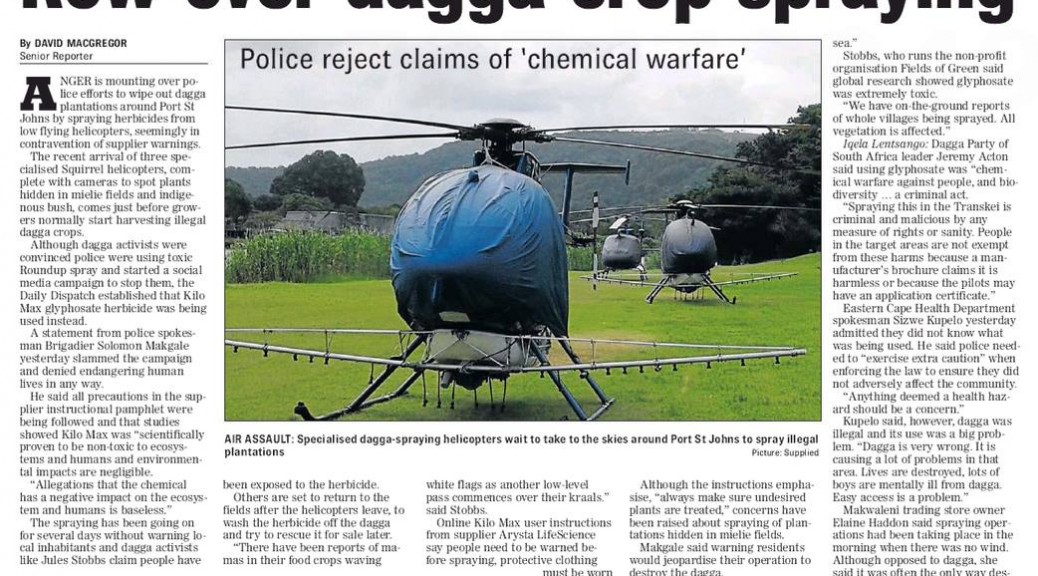Anger is mounting over police efforts to wipe out dagga plantations around Port St Johns by spraying herbicides from low flying helicopters, seemingly in contravention of supplier warnings. The recent arrival of three specialised Squirrel helicopters. complete with cameras to spot plants hidden in mielie fields and indigenous bush, comes just before growers normally start harvesting illegal dagga crops.
Although dagga activists were convinced police were using toxic Roundup spray and started a social media campaign to stop them, the Daily Dispatch established that Kilo Max glyphosate herbicide was being used instead.
A statement from police spokesman Brigadier Solomon Makgale yesterday slammed the campaign and denied endangering human lives in any way.
He said all precautions in the supplier instructional pamphlet were being followed and that studies showed Kilo Max was “scientifically proven to be nontoxic to ecosystems and humans and environmental impacts are negligible.
Allegations that the chemical has a negative impact on the ecosystem and humans is baseless.” The spraying has been going on for several days without warning local inhabitants and dagga activists like Jules Stobbs claim people have been exposed to the herbicide. Others are set to return to the fields after the helicopters leave, to wash the herbicide off the dagga and try to rescue it for sale later.
‘There have been reports of mamas in their food crops waving white flags as another low-level pass commences over their kraals.” said Stobbs.
Online Kilo Max user instructions from supplier Arysta LifeScience say people need to he warned before spraying, protective clothing must be worn when entering the area before the spray dries and the herbicide must not be inhaled.
Although the instructions emphasise, “always make sure undesired plants are treated.“ concerns have been raised about spraying of plantations hidden in mielie fields.
Makgale said warning residents would jeopardise their operation to destroy the dagga.
“Humans or animals aw not targeted, The chemical spray is absorbed by the dagga plants and therefore the dagga plants start dying after four days.
The spray that lands an the soil binds with the soil and does not run off into ground water. rivers or the sea”
Stobbs, Who runs the nonprofit organisation Fields of Green for All said global research showed glyphosate was extremely toxic. “We have on-the-ground reports of whole villages being sprayed. All vegetatation is affected.”
Iqela Lentsango: Dagga Party of South Africa leader Jeremy Acton said using glyphosate was “chemical warfare against people, and biodiversity …a criminal act. Spraying this in the Transkei is criminal and malicious by any measure of rights or sanity. People in the target areas are not exempt from these harms because a manufacturer‘s brochure claims it is harmless or because the pilots may have an application certificate.”
Eastern Cape Health Department spokesman Sizwe Kupelo yesterday admitted they did not know what has being used. He said police needed to “exercise extra motion” when enforcing the law to ensure they did not adversely affect the community. “Anything deemed a health hazard should be a concern.” Kupelo said, however dagga was illegal and its use was a big problem. “Dagga is very wrong. it is
causing a lot of problems in that area. Lives are destroyed, lots of boys are mentally ill from dagga. Easy access is a problem”
Makwaleni trading store owner Elaine Haddon said spraying operations had been taking place in the morning when there was no wind. Although opposed to dagga, she said it was often the only way desperately poor people could survive. She said the weed should rather be pulled by hand instead of using sprays which poisoned food. “it is causing a lot of hardship and heartache. It is tragic that they are losing everything.”
This article first appeared in the Daily Dispatch


One thought on “Police Reject Claims Of Chemical Warfare Upon Daggafarians”